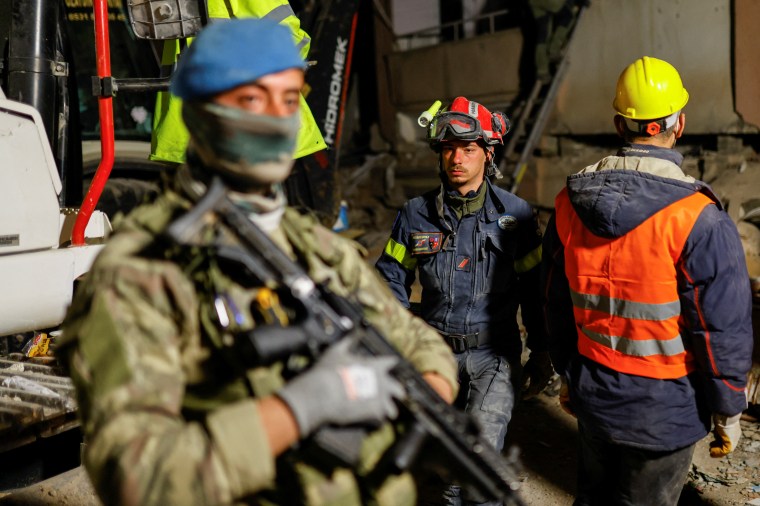Istanbul, February 14, 2023 — Turkish authorities must ensure journalists can cover the aftermath of the recent earthquake freely and safely, and should drop investigations into any members of the press, the Committee to Protect Journalists said Tuesday.
Since a 7.8 magnitude earthquake struck southern Turkey and parts of Syria on February 6, killing tens of thousands, authorities in Turkey have detained at least four journalists, opened criminal investigations into two reporters and one commentator, and harassed or obstructed at least six other members of the press, according to news reports and journalists who spoke with CPJ.
“Turkish authorities should not interfere with the journalists reporting on the terrible earthquake that recently hit the southern parts of the country, and should allow them to inform the Turkish people and the world on the magnitude of this disaster,” said Gulnoza Said, CPJ’s Europe and Central Asia program coordinator, in New York. “Authorities should drop all investigations into members of the press, allow reporters to work freely, and ensure that journalists can work without fear of harassment.”
On February 7, the Istanbul chief prosecutor’s office opened criminal investigations into journalist Merdan Yanardağ and commentator Enver Aysever, according to a report by the state-owned Anatolia Agency.
Authorities are investigating Yanardağ and Aysever for allegedly “provoking the people into animosity and hatred,” according to that report, which said the investigation into Yanardağ stemmed from his on-air comments criticizing the government’s response to the crisis he made as chief editor and anchor for the pro-opposition TELE1, and the investigation into Aysever, an author and commentator, was related to unspecified posts he made on social media. Aysever has 1.7 million followers on his Twitter account, where he frequently posts political commentary.
An Istanbul prosecutor questioned Yanardağ on February 10, and the journalist is banned from foreign travel while the investigation is pending, TELE1 reported. Aysever told CPJ via messaging app that authorities had not contacted him regarding the investigation as of Tuesday. If charged and convicted, they face between one and three years in prison.
Separately, authorities are investigating Mehmet Güleş, a reporter for the pro-Kurdish Mezopotamya News Agency, for allegedly “spreading misinformation,” according to news reports. Police detained Güleş in the southeastern city of Diyarbakır on February 8 while he was interviewing a volunteer rescue worker, and asked whether the volunteer had criticized the state’s reaction to the disaster. The investigation stems from that interview, which was not published. He also faces one to three years in prison if charged and convicted.
Police also briefly detained and questioned Volkan Pekal, a reporter for the leftist daily Evrensel, on February 7 for allegedly recording video without permission while interviewing victims at a hospital in the city of Adana. Separately, police detained and questioned Mahmut Altıntaş, a Mezopotamya reporter, and Sema Çağlak, a reporter for the pro-Kurdish news website JİNNEWS, in Şanlıurfa province on February 8 as they were filming a collapsed building because they allegedly did not have proper identification as members of the press.
Police in Diyarbakır also obstructed at least three journalists from covering the earthquake by barring their access to some areas, according to a report by Turkish nonprofit Media and Law Studies Association, which identified those journalists as Sertaç Kayar, a reporter for Sputnik Turkey, the Turkish arm of Russian state-funded news agency Sputnik; Arif Bulut, chief editor of local outlet Ajans Sur; and Sıddık Eren, a reporter for the Iraq-based Kurdistan 24 TV.
A police officer also kicked Ferit Demir, a reporter for the pro-opposition Halk TV, as he was following the rescue efforts in Malatya on February 9, causing him to fall and hurt his leg. And on February 11, freelance journalist Rabia Çetin tweeted that a group of village guards had threatened her in the province of Hatay and told her to leave, and Zübeyde Sarı, a reporter for the news website Kampana News, tweeted that she had been obstructed from recording video of the rescue efforts in Hatay.
Civilians have also harassed at least two journalists: an unidentified man shoved Serdar Er, a reporter of the pro-government news broadcaster CNNTürk, as he reported from the city of Adıyaman on February 11, reports said, noting he was unharmed. And in the city of Antakya, civilians verbally harassed Halk TV reporter Şirin Payzın on February 9, according to a report by her employer.
CPJ emailed Turkey’s Interior Ministry and the Istanbul chief prosecutor’s office for comment but did not receive any reply.
